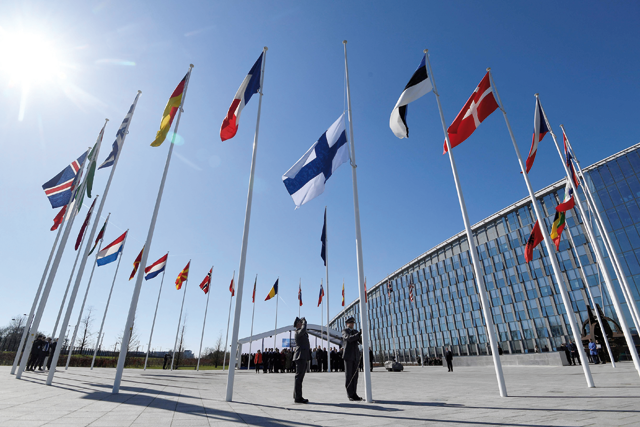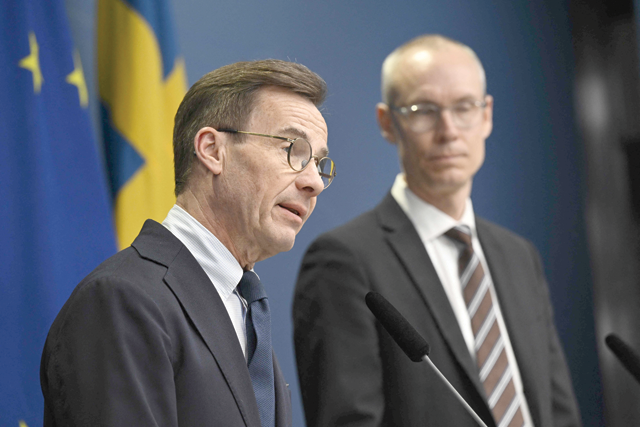You are here
Uneasy NATO wait ahead for Finland and Sweden
By AFP - May 12,2022 - Last updated at May 12,2022
STOCKHOLM — Wary of provoking Russia's ire over possible NATO bids, Finland and Sweden have spent recent weeks seeking assurances from NATO members that they would be protected while awaiting full membership.
Russia's invasion of Ukraine has swung opinion in Finland and Sweden in favour of membership of the Western military alliance, after decades of military non-alignment.
As a result, Stockholm and Helsinki have cranked up their international contacts to seek support for their potential bids, which could be announced in the coming days.
All signs point to a joint application, with the talks in recent weeks centred on obtaining crucial security assurances, in particular from NATO's most powerful members, according to Swedish and Finnish leaders.
The application process requires lawmakers in all 30 NATO members to ratify a country's membership bid, a procedure which can take months or even up to a year.
During this period, candidate countries are not covered by NATO's Article 5 mutual defence agreement.
NATO Secretary General Jens Stoltenberg has said he is “certain that we will be able to find arrangements” to help protect the two hopefuls.
In the case of Sweden, he said a “heightened presence of NATO and NATO forces around Sweden and the Baltic Sea” was a possibility.
“If Sweden were attacked and looked to us for support then we would provide it,” British Prime Minister Boris Johnson told reporters on Wednesday after signing a Political Declaration of Solidarity, including military means, with his Swedish counterpart Magdalena Andersson.
He was due to sign a similar agreement in Helsinki later Wednesday.
“It’s not as solid a guarantee as Article 5, but that is what we’ll get during the interim period,” said Joakim Paasikivi, a lieutenant-colonel who teaches military strategy at the Swedish Defence University, told AFP.
As members of the European Union, Sweden and Finland are also covered by the bloc’s mutual defence clause in Article 42-7.
Once a country has decided to apply for NATO membership, the 30 members of the alliance must agree unanimously to extend a formal invitation, which is followed by membership negotiations.
Finland and Sweden have long cooperated with NATO, and Stoltenberg has repeatedly said they would be welcomed “with open arms”.
This first phase could therefore go rather quickly.
It “can take from a few days to a couple of weeks”, said Charly Salonius-Pasternak, a researcher at the Finnish Institute of International Affairs, told AFP.
The final go-ahead could then take place at a NATO summit in Madrid at the end of June.
The 30 member states would then have to ratify the decision.
“At the moment it is difficult to see that any country would actually try to slow or stop the process,” Salonius-Pasternak said.
A country could however take advantage of the situation to try to gain leverage on a domestic issue.
Croatian President Zoran Milanovic has for example urged the parliament in Zaghreb to block Sweden’s and Finland’s admission as long as neighbouring Bosnia does not amend an election law.
The ratification process for the newest NATO member, North Macedonia, took one year.
Finnish Foreign Minister Pekka Haavisto said Tuesday he believed Finland could become a full member by October at the earliest.
Even before the war in Ukraine, Moscow regularly warned Finland and Sweden about the “political and military consequences” of joining NATO.
Military strategist Paasikivi said the countries could expect to see “aggressive and threatening Russian rhetoric” during the application period.
There could also be “hybrid measures”, such as “cyberattacks, which could be more serious than before, against our countries”, targeting financial or energy infrastructures — or violations of the two countries’ airspace or territorial waters.
Experts questioned by AFP said, however, that a military attack was highly unlikely, given the Russian army’s mobilisation in Ukraine.
According to Salonius-Pasternak, Moscow could technically attempt to block the membership process.
Russia could “stop the application process by occupying an island or a piece of land”, as countries with an ongoing conflict are barred from joining NATO.
“This is possible, as they have recently made decisions which do not seem very rational from our perspective”, Salonius-Pasternak said.
“But I think NATO countries would see through this and it would not be too challenging for Finland to handle militarily.”
Related Articles
BRUSSELS — Finland became the 31st member of NATO on Tuesday, in a historic realignment of Europe's defences that drew an angry warning of "
STOCKHOLM — Swedish Prime Minister Ulf Kristersson said on Tuesday the likelihood that Finland would join NATO before Sweden had "increased"
STOCKHOLM —Sweden is ready to manage a future NATO land force in neighbouring Finland, which shares a border with Russia, the two newest mem
















